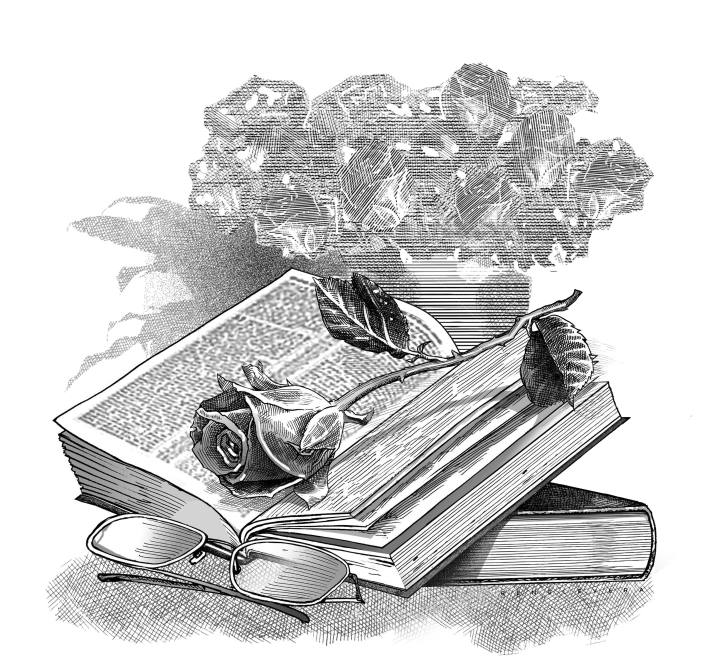
That sunny morning, having come out of a bookshop, I passed by a young woman by the entrance of a car park selling plants. She had before her about four or five flowerpots. One held a lush growth of forget-me-nots, two had little shrubs bearing a red rose each.
Since I have a thing about roses, I stopped and turned towards them. I guessed that, with their compact flowers, they probably belonged to the “Heritage” or “Old Blush” lineage. I thought of buying one pot, and teaching the red rose to climb and join the pink that already hung over the balcony. What a good thing, I thought, for this girl to sell her flowers next to a bookstore. Perhaps she felt that those who read books also loved roses, and that they had the mind, if not to grow them, to use a flower as bookmark, pressed between the pages, and moving from chapter to chapter of a romantic novel, at the end of which, the petals to be pulled one by one to check if somebody really loved them.
As it happened, I had my hands full when I went home – the left holding the red rose and the right cradling a book (no, not a romantic novel, but a paperback on Thomas Aquinas).
Accordingly, I positioned the pot beside the vine of pink roses. Everyday I would check on the little shrub and its red flower until its petals lost firmness and fell to the ground – a matter of about a week.
I had my man spoil the plant with water and dung – and light (by moving it here and there to counter the sun’s moves on the chessboard of days).
In time, as I expected, the plant gave me a rosebud, but to my surprise it opened into not red but pink petals, no different from those on the blooms of my old vine. I could have taken it as a mysterious transference, if not for a gnawing suspicion that the girl had deceived me by deftly immersing the pink petals of the rose into the fire of a scarlet dye. Which a quick trip to the place by the car park confirmed – the vendor and her flowerpots had disappeared.
This kept me thinking about the matter of credibility. I do not consider myself rash in believing that what the girl sold was a red rose, because I actually saw its cover if not its bed of crimson joy. Did I have to spray it with water to verity the authenticity of its redness? Some people do this to the gills of the fish in the market.
I need to trust people. If I go to a restaurant and order bouillabaisse, I must accept that the cook did not spit or do a culinary version of the soft-shoe by dipping his shoe into the soup.
Friendships build on trust.
In his Gospel, John narrates about the incredulity of Thomas about his colleagues’ claim that they had seen the risen Lord. When told of this, Thomas exclaimed, “Unless I see the mark of the nails in his hands and put my finger into the nailmarks and put my hand into his side, I will not believe.”
Surely, Thomas was stumped by the report, and his reaction might have resulted less from genuine disbelief than from a profound wish that it was true. But in effect he accused the other disciples of lying and in the process abandoned their friendship which was built on trust.
When a week later Jesus appeared and told Thomas, “Put your finger here and see my hands, and bring your hand and put it into my side, and do not be unbelieving, but believe,” he cleared the other disciples of what Thomas had regarded as deception, and reestablished the importance of trust in one’s relationship with others and with God.
Faith requires a blind spot in the mind’s eye. Without its risks faith cannot be faith, which was why Jesus said, “Blessed are those who have not seen and have believed.”
Tiburtius, one of those martyred during Diocletian’s persecution of Christians in the third century, did not see but believed in the risen Christ, because of which he was beheaded. But before that, he was made to walk on red-hot coals. He made the sign of the cross to protect himself and suffered no injury. Alluding to this, Thomas of Aquinas wrote that, when Tiberius walked on the hot coals, he seemed to himself to be treading on roses.
Which somehow was how I felt about my purchase, joyful, having believed that what I saw was a red rose and bought the flowerpot from the girl.